Welcome to Advertising in America, the podcast, where we meet entrepreneurs, where they're at in their marketing and bust through their bottlenecks, breakpoints, and blind spots hosted by Wizards, Ryan Chute, and the Royal Torbay twins, where we put the fun in marketing fundamentals. Are you ready to dominate your marketplace?
Are you ready for outrageous advertising? Do you want to become a household name brought to you by Wizard of Ads for Services?
Visit us at wizardofads.services to book your free strategy session with Wizard Ryan Chute today.
Ryan: On today's episode of Advertising In America, we're getting biblical up in here. Is Google God or is it the Duty-Free Shop you're forced to walk through when you're travelling international? Is Google God or is it a false idol? Here to search for the holy grail of answers, Mick Torbay.
Mick: The topic today is, Google is God and in the strictest sense, that statement is true. I think for the first time in American history, it's safe to say that one medium dominates every other, and that's Google. I'm sure some Madison Avenue person would have said that TV was king in the 50s or 60s, but that didn't mean you couldn't have a successful campaign using just radio, or billboards, or newspaper ads. In 2024, we have one that completely dominates, and we have all the other ones. And the dominant one is Google. Nobody needs a radio campaign. Nobody needs a TV campaign, but you need Google. You cannot successfully market your business and just ignore Google. You can't just opt out of pay-per-click, or Google My Business, or any of the other Google marketing platforms. It has to be part of everyone's plan, and everything else has to work around it. Think about it, let's say you're a startup, a new store, a brand-new plumbing business. Step one, you need a website. Step two, you need a path to people getting to your website. They will not come just because you build it, you have to pay to get them there. If you're opening a new business, you need leads and you need them now. And only Google can provide a lead to a new business owner today. All the other media we talk about radio, TV, outdoor, transit, direct response, all of that shit takes time. Time that a new business owner doesn't have.
So, yes, you need to have Google, or you'll be out of business before you start, which basically means, Google is God. But just because you need Google to succeed doesn't mean Google alone can put you in a leadership position. It simply gets you in the game. Google also sells to your competitors. Google does not care about your market share. Never forget that.
Ryan: Sounds devilish. Chris, what do you say? Baptism or exorcisms?
Chris: As Mick alluded to right at the end, if Google is God, it is definitely the cruel Old Testament God. Or, maybe Google is Satan, equally powerful, but secretly he's here to take you for everything you've got, all you have to do is bite the apple. In the old days of the Yellow Pages, if you wanted to find Dave's Plumbing, you could look under plumbers and there would be. Or if you didn't have a brand name in mind and you just looked up plumbers in your town, there they would all be, including Dave's. On Google, if you Google plumbers near me, you get the companies who pay to come first on the list. If the best company in town doesn't pay to be at the top, even the best company in town won't be listed. You think you're getting the top 10 plumbers, you're getting the top 10 bidders. That's evil. And that number can get expensive, the pay-per-click cost on Air Conditioners Houston is like, 300 bucks. And that's just to send them to your website. You don't have a customer yet, just a click. Google is only God when it comes to targeting people who are searching blind. They helped those people, however, unfairly. If you're looking for a plumber, or a restaurant, or a used car dealer, and you literally have no idea where to start, Google's your answer.
And if you want to build your business on those customers, the total clueless newbies, you can do that with Google. But they will make you pay, and tomorrow they will make you pay again. A better strategy, of course, is to not have to genuflect in front of this god in the first place. If you build your brand offline, people will have a brand in mind that they already know when they need an insurance broker. They will have a brand that they think of right away, and already like the best, and are already predisposed to do business with. But Google can't get you that brand preference and brand loyalty with pay-per-click, or Google My Business, or whatnot. Hell, Google builds their brand, and the Pixel Phone brand, for example, in offline campaigns to make people interested in their products before they have a need. Google doesn't want you googling the best cell phone. They want you to search Pixel Phone. So, they advertise. Nice one, god.
Ryan: Chris, I'm, but a simple caveman. What does Genuflect mean? Are you there, god? It's me, Margaret. Can't you just help me instead of siphoning 30% of my profits out of my business? When we get back, we'll explore the catacombs for the ways of the virtuous marketer. Stay tuned!
Hey, listeners. Wizard Ryan Chute here. Want a personalized strategy that instantly 4X the effectiveness of your marketing dollars? Schedule a free call with me at wizardofads.services. We'll chat about your goals and how you can quickly dominate your marketplace. I have limited availability though, so don't delay.
Well, I guess you could delay a bit, but not too much. That'd be like an over-delay. So maybe you just skip the delay part entirely and book a call just as soon as you're ready to start making money. You certainly don't to delay that, right? And now, pitter-patter.
Ryan: Fun facts. Bob Hoffman's recent book, Inside the Black Box. No, not that black box. He states online ad fraud scale is staggering, with some estimates suggesting that a significant portion of online advertising budgets, potentially, 30 to 40% of your budget is wasted on fraudulent activities. Hoffman claims ad fraud operates on a scale larger than certain types of organized crime. Absolutely astounding.
Mick: Not that there's anything wrong with that.
Ryan: No, we love those guys. The ad fraud has become so pervasive and damaging with 50 to 63% of all web traffic being bots. Not all that malicious. But all of that being bought traffic, business owners are placing all of their faith in a single lead generation platform that's dangerous. It's like a helicopter, if you think about it, it's one point of safety versus a plane with what, three?
Mick: Now my wife is never going to let me get my helicopter license. Do not talk about single points of failure with helicopters when I'm trying to get my helicopter license.
Ryan: He's trying to get his helicopter license. It's not gonna happen. So, a Google is like a helicopter is what you're saying?
Mick: What is crazy is that we accept Google's statistics at face value. When it comes to radio ratings or television ratings, we obviously wouldn't trust the radio station or the television station to tell us, how many people are watching, or how many people are listening. So, there's Nielsen, there's two different ones actually, that will do ratings and figure out scientifically, how many people are actually watching a particular station or program at any given time. And they are completely separate from the people who are selling you the product that they claim to measure.
In the case of Google, it's Google that says, Oh my goodness, there's a lot of people clicking on your ad. How do you know? Cause we're Google. Now, does Google have the ability to figure out just how much of its own traffic is bots and bullshit? I would say, they do have the ability to do it. Are they going to a lot of trouble to figure it out? Strangely, no, I think it's because they have no they have no incentive to do so.
Chris: Which is interesting, because the raison d'etre of, if I may briefly lapse into the French, of digital marketing is, Oh, you shouldn't be paying for anything that's wasted, you should just pay for the clicks from people who are deliberately looking, so that's how it's going to work. And then you find out that, that medium is in fact, full of fraudulent clicks that aren't the ones anyway. That was the whole thing that was supposedly setting you apart from TV, where anybody could be watching it around and above, the people that you actually wanted to reach.
Mick: But if you ask Google, how many of those clicks are bullshit? They'll say, we don't know.
Chris: Yeah.
Mick: That's freaking terrifying! When it's such a huge percentage of your budget. And if this guy's right, that 30 to 40% of your money is being spent on non-people, that's ridiculous. Especially, when you consider that each one of them are ridiculously expensive anyway, it's ridiculously expensive. If a hundred percent of those people were real people.
Chris: Yes.
Mick: In the last episode we were talking about targeting, who's not the target market? Non people.
Ryan: Those are the worst people for buying stuff.
Mick: Bots don't buy shit.
Ryan: They have no need, right? Maybe some sort of oil? Like a metal polishing thing…
Chris: Yeah. How about another fun fact?
Ryan: As I entertained the idea of fun facts, this time, I was really starting to think of, what are the metaphors that Google might be, right? Is Google God? That's a metaphor that we've explored in kind of depth. What about Google as a casino, right? Casino Google At this casino, you put all of your chips at the roulette table. I just did this with one of our partners, Ray Seggern the other day, and he lost a lot of money, and I was up by the end of it. And here's why. He took all of his chips and he put them all in the inside centers, and he's just, like, bet, bet.
And he put 20 down and he'd get 17 back if he was lucky or less. And I just watched and watched. And I was watching, the other guys playing, and I was watching the board, and odds, evens. And I was, like, alright, while you guys continue to lose money, I'm just gonna slide it to the side here where it's a 50/50 chance, right? I'm gonna get, like, odds, evens, reds, blacks, full stop. I slide one in, double my money, take out the money, leave the same money in, lose that one, slide the other one back in, I'm up. After four goes, I'm up, I walk away. Ray is now out 80 bucks.
Mick: Do not use this system in Vegas. You're going to go broke.
Ryan: Terrible system. But how is that not any different than Google? Where you're literally, just one of the numbers on the board, you're hoping that the person is going to slide their chips onto your number, or even a corner spot where they called you and they called your competitor, right? When there is no place where the customer really makes any other distinction besides best guess?
Mick: At the risk of overextending this metaphor, the house always wins. And Google is the house, and they win, whether it's you, they win if it's somebody else, they win, they're taking money off both ends. They never ever lose.
Chris: And the other thing is this whole metaphor is describing a scenario where all you're doing is getting the name displayed, or getting the click option listed. And we are the first ones to rail against this idea of, all I got to do to build my business is get my name out there.
Just because your name is at the top of the list, you have yet to give me a reason why I should choose your name. I know nothing about your name. All you've done is put your name in front of me, but you haven't given me a reason to choose it over number two, or over number three, other than it's at the top.
But, you haven't said anything about your business. You haven't told me what kind of business you are. You haven't told me about your products. You haven't told me about your values. You haven't told me what makes you distinctive.
Ryan: And one of our Digital Wizards, Vi Wickham, has recently discovered as he was searching through the analysis of, how many people are actually clicking through. And it's significantly less than 30%, right? That click-through to the website, right? So, it's not your website that's going to save the day in these cases unless you have that percentage of people who are studious enough and doing their research enough to say, that's the place I want to work with or they're good enough, right?
Mick: And even if they do click through it doesn't mean they're gonna buy anything from you.
Ryan: Absolutely not, they might be clicking right back out. Because it's not congruent with what they're expecting.
Mick: But Google keeps the money if you do that, right? They do keep the money, I worry about that sometimes.
Ryan: I think of Google as another metaphor, I think of Google as a sock. Where the customer is the boot, and my foot is my business, and every single moment of the day, they're trying to wedge themselves in between me and my customer. And there's plenty of ways to get away from relying on Google, right? Frankly, you could just find customers who are Crocs, right?
Mick: I think, a better analogy is that I'm the sock and Google is the Red Hot Chili Peppers.
Ryan: Fun facts. Google really does thrive on the hapless masses who step into this den of undecided, right? They are relying on a whole bunch of businesses to just give them just gads of money to be in front of people who have no chosen provider. And that's the candy land for these guys. It is making them a fortune and it's making them a 30% stakeholder in your business with zero liability. It's really quite unfathomable. So, yes, Google is absolutely a necessary pertinent thing. There is no question that digital presence will never change as a requirement moving forward in this, in the history of business and marketing. But can we curtail that? Can we cut them out of the middle and get them going straight to us, straight direct searches, straight organic searches, straight things that get them to us? And the answer is unquestionably, yes, right? We can't have this ongoing ever-ending, never-ending reliance on a channel that's not working to your benefit.
Mick: And remembering that Google, of course, is going to always recommend that you find a new way to pay them more money. They're never going to let you in on the idea that, there's a way to skip them almost entirely. Even when they themselves are running TV campaigns and radio campaigns, they just think the rest of us are gonna ignore that.
Ryan: Probably the biggest challenge I struggle with Google is that they really do practice in the extortionary arts. When you think about them having this fake bidding system where they're the salesperson, but they're also the ones saying who's going to spend how much, right? Who are you bidding against? All the other guys who have already listed what they're willing to bid, and then where that shows up? No, this is an elaborate ruse that we all have to subscribe to because there is no other alternative. Hell, they're extorting you out of your own name, for god's sake, and they're allowing other people to infringe upon your trademark every single day. These are not the practices of a gracious God.
Chris: Having said that, we can still get you into a position where that's what you're Googling and therefore you're saving a ton of money because that actually allowing other people to bid on your name is something that is possible, but it's not actually done very much. So, what we can do is we can get you from having to buy clicks on air conditioners near me and get you to Chris' Air Conditioning Company. And then you will still Google Chris' Air Conditioning Company. Google will not be out of the equation. But when you Google Chris' Air Conditioning Company, first of all, it's going to come up first.
Now, if somebody else wants to buy that link as well and try to bid me out on it, then they can. But the interesting thing is the person who was Googling was hoping to get my website link, right? You could try and buy your way into the top of the list when you're Googling my name, my business name.
When people click through, they're gonna go, this is mixed air conditioning, I'm not gonna go there and they'll come back out. So, it's a bit of a wasted thing. What is most important about that whole thing is air conditioners near me is gonna be $300 a click. Chris' Air Conditioning is gonna be a dollar a click. So, yes, you still get extorted out of that buck. Google is still getting a dollar for your own damn name, but they're not hosting you the way they are for some of those completely generic terms.
Mick: The thing with Google is that they don't even follow the superheroes' code. They are incredibly powerful and with great power comes great responsibility, but they don't do the great responsibility part. They are in no way concerned about the success or failure of their individual clients. They don't care about your market share. They want the most money from the most people, and they will encourage all of your competitors to try and outbid you so that you all keep increasing the amount of money you're prepared to spend with Google. That's the only thing they're interested in.
Remember that saying, only half of your marketing is working, you just don't know which half? Let's help you with that. Book a free strategy session with Wizard Ryan Chute today at wizardofads.services. Yes, that's a URL, wizardofads.services. Now let's get back to the show.
Ryan: And this is what's led to a lot of the challenges, obviously, the loss of the Antitrust Case that they just lost. And that's really an exploration on the international governments of the world to look at and go, Hey, how do we break this up to give some level playing field instead of a monopoly or oligarchy?
As you guys spoke about this, I think about Google metaphorically, again, as a prison, right? Google is a prison, particularly if Google is the only place that you are now. If you get locked up into prison, you're going to be their bitch. You've got to do what they say, they can take you down.
Chris: To me, an interesting comparison, that idea from philosophy about, necessary, but not sufficient cause, right? Google is unquestionably necessary. And we've talked about this in other shows. You have to have a Google presence. If people search your business name or your product name, something has to come up. And so, you have to play the game enough that you are in that list when people do look for you. But it is not sufficient to build a dominant brand because of the things it doesn't do. It doesn't convey a reason, why you? It doesn't say anything about what you do. Why you do it? Why you're the better one? Why you're superior to competitors? Any of those other things, all it will do is build that awareness.
But it has to be there because if not, you will be invisible and people will Google you because they think they've heard of you, or saw you the advertising or whatever. You've got to be there when people look, so it is necessary, but it is not sufficient cause. It is not enough to complete the task at hand, which is make you the brand of choice, the brand that people already have in their heads when they have a need for whatever it is that you do.
Mick: And furthermore, you can't build a relationship with Google because you won't bother to search until you're ready. So, therefore, you can't have a one-year relationship with a brand before you make that purchase when it comes to Google, because Google starts with the search. If you don't need a water heater, you're not searching water heaters. Whereas if you have an offline campaign that's talking about why Ryan's Water Heater Company is such a great one, and entertaining you, and making you feel good about them, and making you think man, that's the kind of outfit I'd like to work with. You can't do that with Google because you don't get anything until you begin searching. Again, narrowcasting that smaller group of people, the ones who want to buy today. And I know they matter, but they don't matter as much as anyone who might ever buy this product or service ever. There's more of them, and there are less expensive ways to reach them.
Ryan: Far less expensive ways to reach them, instead of the very last moment of truth before they do the click with you and probably, quite a few others to whoever's going to be the cheapest and fastest to get them in home services, and certainly in a lot of other professional services, people are looking for that convenience, only in those situations where a company has some level of exclusivity or the ability to internally motivate the customer through some sort of feeling, status, and class, and leverage will they ever stand a chance to actually get some durability in time, some grace in the time? One of the things I love that you asked during the discovery process that we do with all of our clients is, what do you do to have people know, like, and trust you before they get to Google?
Chris: Yeah. And they always get that same sort of guilty look about them, the embarrassment sort of wipes over their face, and you kind of seem to squirm a little in their seats.
Mick: In fact, I actually set them up a little bit. I say, how important would you say in your category, in your business, how important is trust? Let's say, Oh my goodness, it's everything. It's 100%. We're going into people's houses. Trust is super duper important. Good, okay. So, what are you doing to create trust with your consumers before they interact with you? When we're talking to them on the phone, it's like, before they call you. On our website. No, before they interact with you. See, they won't call you if they don't trust you, you just told me that.
Like Chris says, there's 50 people who will sell you the same product or service that you sell. They're not going to call them all, they're going to call the 3 people, ideally, 1, tops 3, who they trust. What are you doing to create trust? And by trust, by definition, a relationship.
You don't trust anybody just because they exist, you have to feel something about people. Trust is a feeling. If they don't feel something about you, they can't possibly trust you. How are you creating a feeling between you and your consumer before they have a need and before they call you? And if your answer is, I don't know, then you got yourself a problem in your business. Trust matters.
Ryan: Absolutely. And look, there's one thing to be said for customers trusting you after they've interfaced with your business, or had a loved one that they trust interface with your business and refer you. But again, this is a chicken and egg conversation of, what did you do to get that customer to come in and trust you so much? I respect the fact of word of mouth, we rely heavily on word of mouth in a mass media campaign, because not everyone listens to a radio or sees that billboard. But the good stuff gets spoken about at the water cooler and if they did a really good job, they remembered your name.
Mick: And right now, the answer that I get to that question. I used to get no answer at all. We do very well with our Google reviews and we've got 4.8 stars. And I say, is that the best rating in this community? The best rating. And if it's not, then there's someone else who's more trustworthy than you. If that's all you've got is Google reviews, you sure as shit better have the absolute highest number. If you've got anything else other than the highest number, you have failed the trust test. So, you've got to have something else, what is it?
Chris: Excuse me for being the Luddite who looks at that whole thing and says, ah, whatever it is, this new stuff is bullshit. We are rapidly realizing that 5-star reviews is a sham, right? Basically, everybody has 4.9 or 5 stars, like, any business. It started with Uber, right?
Where every driver expects 5 stars. If you just do what I hired you to do, I'm supposed to give you 5 stars. I'm not supposed to leave any room for better. I always used to think, Oh, you give a guy 4 stars cause could it have been better? Sure, it's like the Olympics. You give somebody 9.5 because there's always somebody who could be better than that, so you don't give them a 10. There's nothing that's ever 10. If people do what you ask them to do, they expect 5. And so, everybody's got 5 stars. And pretty soon, that whole five-star review thing is just going to be totally moved because we know the system is gamed.
Ryan: Google is all but a monopoly, it's an oligarchy with very few players in the mix. And the Antitrust Case certainly does come up as one of these things that shine a light on that and determine whether or not that's going to continue being the thing that it is. Is there a way to separate church and state here in a way that has the people who are selling and doing the bidding system, not being the ones who are benefiting and setting the price as well, right?
When last year, Google raised their prices by 10%, didn't bother telling anyone, just started scooping in more money. Today, we have clients who are saying, yeah, our costs are up, our leads are down. I don't really know what's going on. We know what's going on. It's all the same skullduggery that's been going on for all of this time.
We have to realize that, that's good for Google, and Google's a business that's looking to make money. Google is worried about their money right now. They feel that they're not making enough in their ad budgets. So, that means that they need more money from you. Taking a higher percentage of your business to get where they're going, and bleeding out these small businesses at the height of inflation when they're trying to be respectable to their clients.
Look, if you're spending 300 to 600 bucks for a click, or ideally a conversion at the best of times, we'd have to pass that along to clients, and that's pulling up the prices due to this massive monopolistic greed. We have to be willing to do other things and vote with our dollars as business owners to stay away from this over-reliance on a single channel that is not working towards you and with you, but being available to you to collect your money.
Mick: And that has no interest in your ultimate success as compared to your competitors.
Ryan: Yeah, there's no skin in the game for them, they're happy because they know that they're gonna pick up that cash one way or the other.
Chris: And the interesting thing is, again, coming from the big agency world, back in the day, you could place an ad in a TV break with the restriction if you wanna put your car manufacturer ad in a break, you could request that no other car be in that break. Or if you are a beer brand, you get break exclusivity. Even the tv networks would give you that. So, you paid 300 bucks, and if that guy paid 280, right under you.
Mick: Yeah. Even if I Google Chris' Air Conditioning, there will be 9 other air conditioning companies right there. The bastards will put 9 competitors of the exact person that this person is searching wants to find.
Chris: Do you think this is what he was looking for? Oh ya, totally. We will put it at the top of the list. Did you put his nine competitors there too? Damn right I did. Cause you know what, if they happen to click on one of those we’ll make a buck off of that.
Mick: We’ll make a buck no matter what. They don’t care about your market share.
Ryan: And what we've discovered from a few of our friends at some very significant companies across America, is that they're doing this actually purposefully. When you create broader search terms, when you allow more things to fall into a keyword category, you have more false clicks that all pay money. This is an incredibly profitable strategy to soak money out of the advertisers to get the budget results, profitability results that they're looking for out of the advertisers. All it takes is a simple change of the algorithms to allow for this broader search to take place.
This is where the ruse of protecting people's privacy and moving towards topic or interest-based advertising, because of “privacy policy”, and “cookies”, and all of these “third party trackers” that allow us to be more specific about the people that were being put in front of and serving up the best results comes into play. There is absolutely a balance between protecting a person's privacy, both online and off with the fact that they're deeply taking advantage of this as a way to pretend as though, this is a righteous play. When in fact it is a criminal play in a lot of different ways.
Mick: And if you wonder why it is that the Wizard of Ads as a group of people tend to be steering our clients away from investing a hundred percent of their ads in these digital places is because we are paid based on results. If our client gets their fair share, that's not good enough. We're not going to grow our clients and make them a leader that dominates their category using nothing but Google. It simply can't be done. There's only so much money to be spent. So, we're always going to be saying to our client, yes, you have to leave some money for Google, they get their dough, but we're going to be carving a significant amount of that away to something offline so we can bypass Google as much as we can, as often as we can. That's how dominant leaders are made.
Ryan: I can think of three clients off the top of my head that all exceed 13 million dollars in revenue that spend the most insignificant amount of money on Google that you could ever imagine. All of it going towards branded campaigns, none of it going towards the undecided, and boy, oh boy, do they ever see a profitability shift from there. But they also see the good customer, the quote-unquote, good customer, the high cap customer, the conversion, average sale, and profit customer that comes in, listens to what you have to say, cares about you, and actually does the thing that you suggest that they do. Because one, you've earned that respect operationally delivering good quality and the right solutions without being malicious in any way, but equally as much that they want to deal with that company.
And that's a big deal because that's huge amounts of money that just aren't spent on these very troubling transactional leads that expect a lot for a little money because they hold no opinion of you and they hold no regard. If you have no good ideas, if you don't have a way of building trust before they get to Google, before they pick up the phone, before they go searching websites; Google is God.
If you don't have an offline campaign, Google's going to be God, right? If you can't survive long enough for your offline campaign to take root, then Google's going to be God. But remember, God is something to be feared. It's not the virtuous and gracious God that we're looking at. It's the Old Testament vengeful God. So, use Google when you need to use it. It's always going to be in place. We always support it. We always support virtuous, good-quality digital marketers that really do understand how to work within the confines of Google, not try to game it or game their clients at their benefit, using Google's mechanisms.
As you start to evolve your business and look at your marketing as a whole, you can wean yourself off of Google. We promise that's the case because we've done it so many times, but you have to get past that chickening out period, that period of time when you have to invest in those transactional investments and be present and capture the natural demand that is out there, but also invest in the brand.
Branding is hard and Google is making it harder and harder every day to both stay on Google and also to invest those limited discretionary dollars that you have in your business to grow the business in a way that's going to be much healthier and much more balanced along the way. So, that's another episode!
Mick: The good news is, that also makes it harder for your competitors too. So, there is actually an upside to that.
Ryan: That's true. That's another episode of Advertising In America. Thanks for tuning in and we'll see you next time.
Thank you for joining us on Advertising in America. We hope you enjoyed the show and captured a nuget of marketing magic. Want to hear more?
Subscribe. Leave a review. And share this podcast with your friends.
Do you have questions or topics you want us to cover? Join us on our social at @advertisinginamerica.
Want to spend your marketing budget better?
Visit us at wizardofads.services to book your free strategy session with Wizard Ryan Chute today.
Until next time, keep your ads enchanting and audience captivated.


.webp)
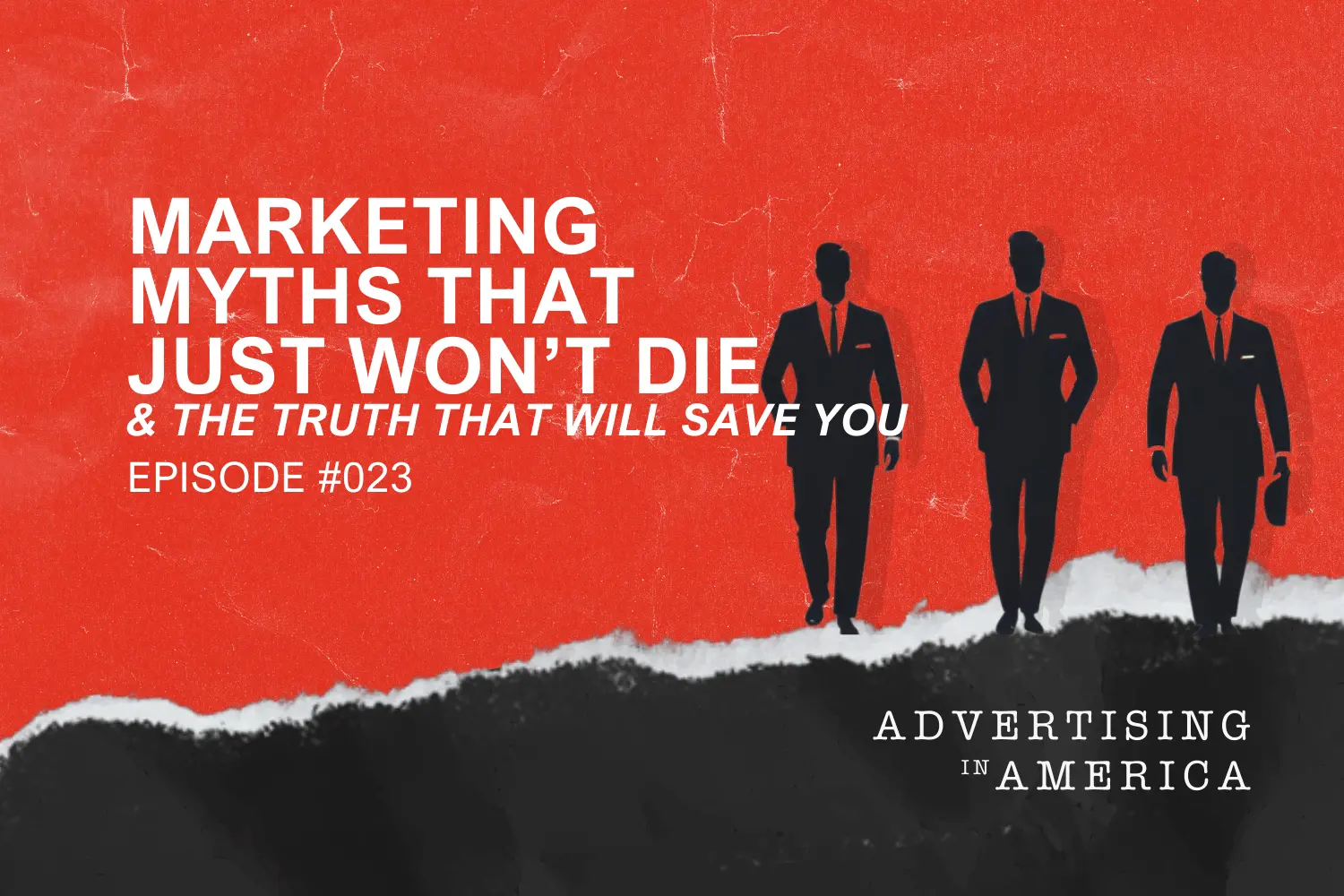

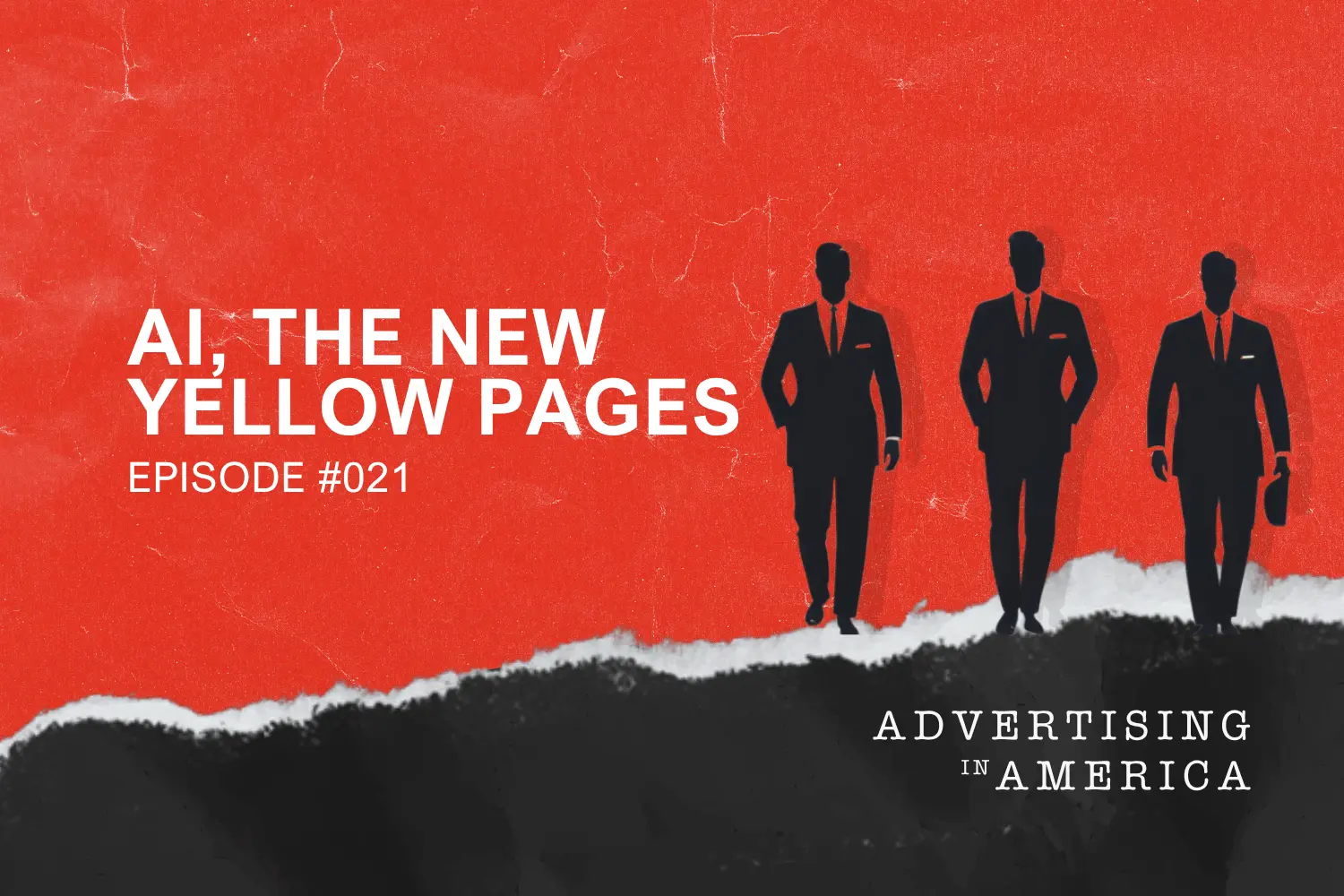

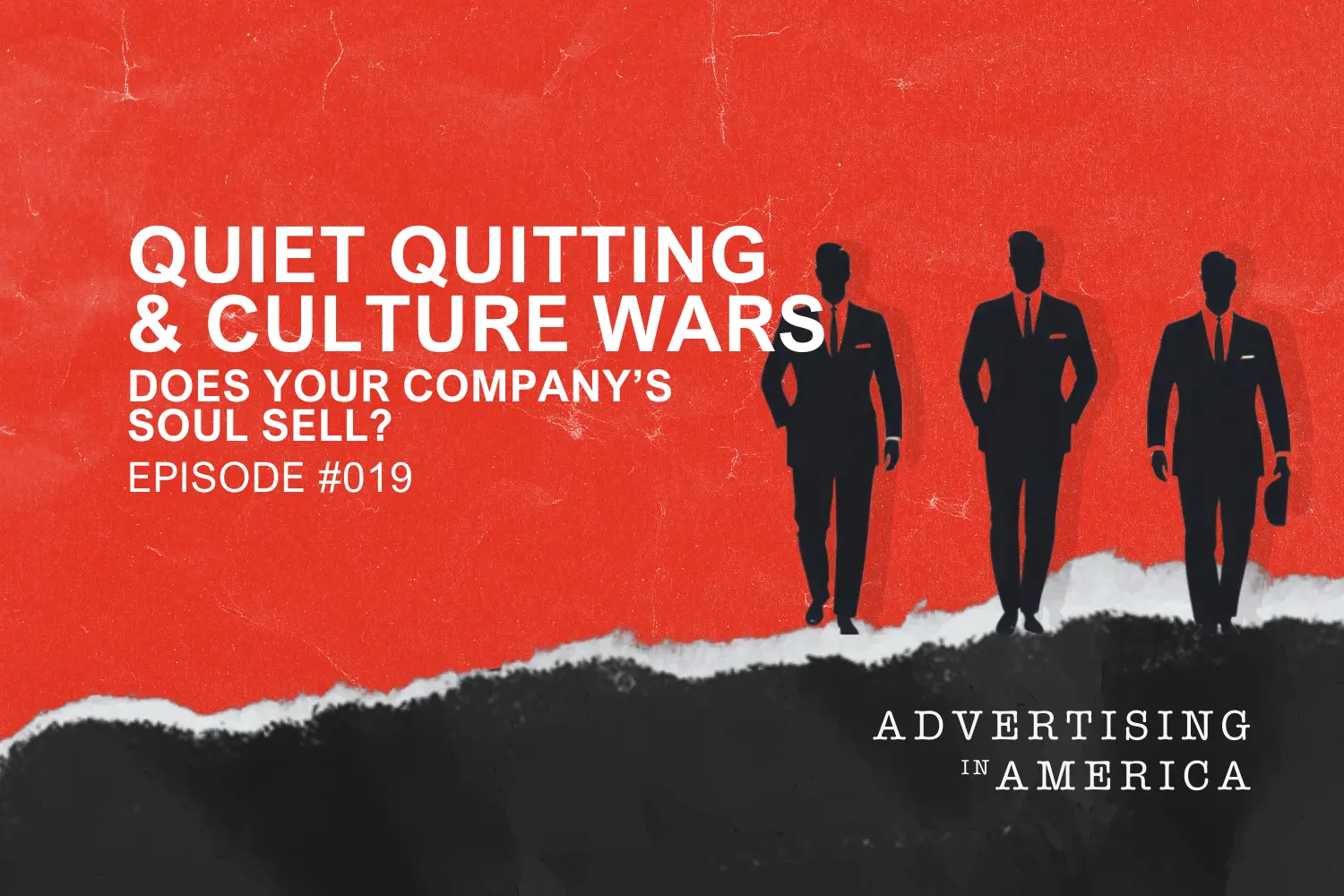
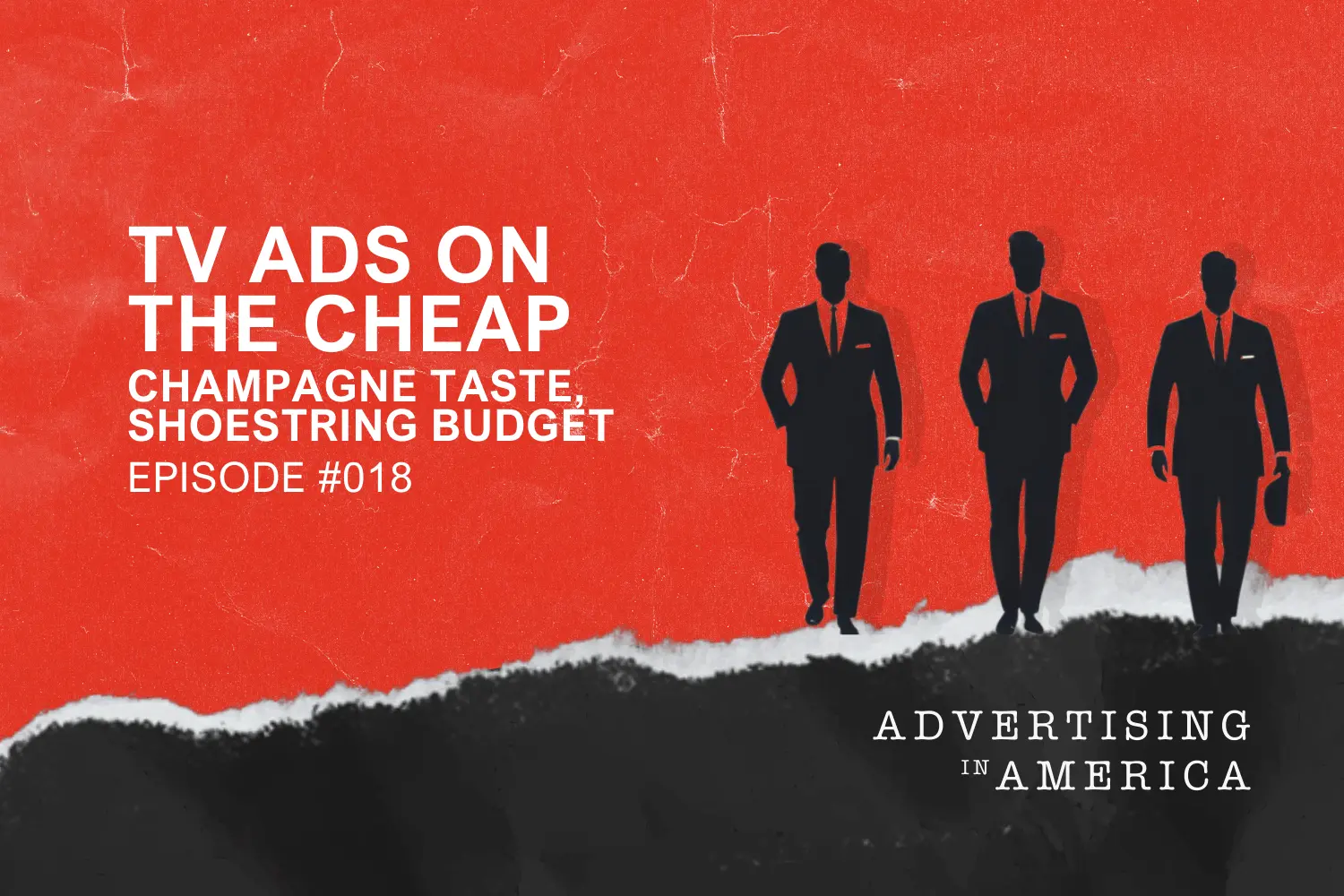
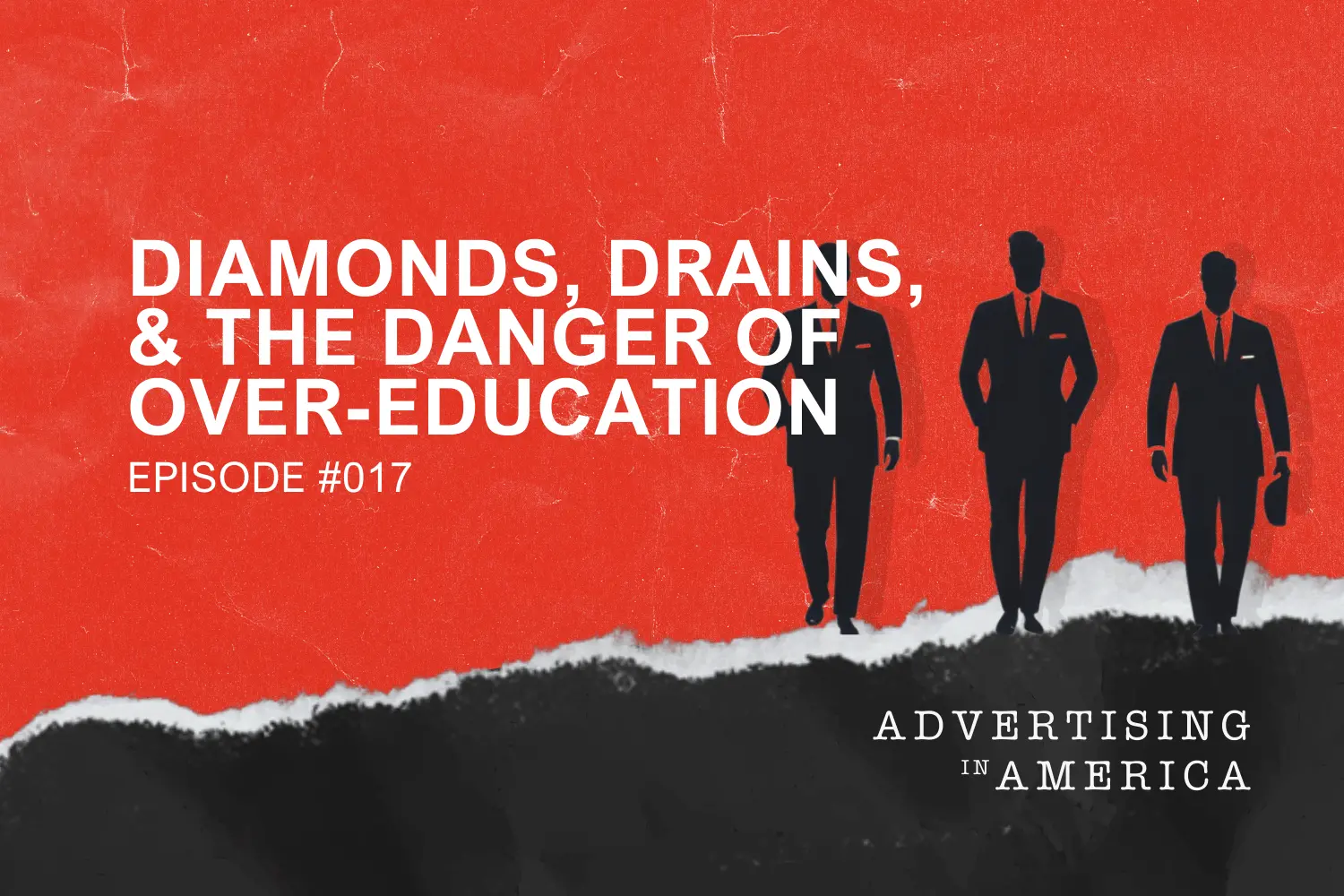
.webp)
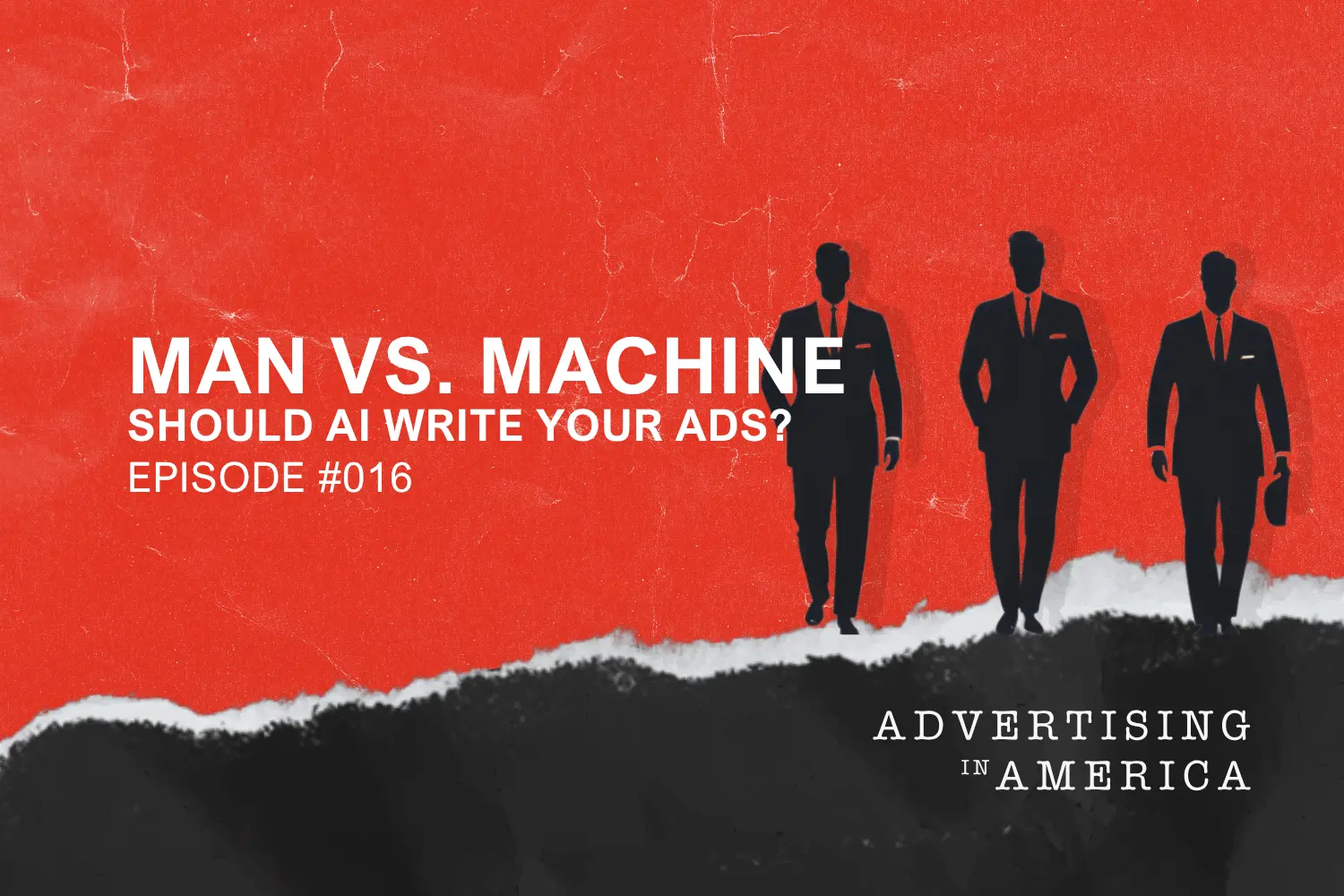










.webp)

.webp)
.webp)

%20(1).webp)
.webp)
.webp)




.webp)


.webp)










.webp)
.webp)


.webp)
.webp)







